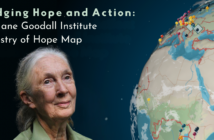We are constantly flooded with digital content, particularly in the form of news online. This is an exciting time, primarily because so much information can be accessed so easily by so many. Current events are broadcast to mass audiences in real time, and social media allows users to engage with material and with one another regarding issues that matter to them (social media is Jane’s fifth reason for hope!)
With this level of access, there is a dark side as well. Rapid digital circulation of news often breeds misinterpretation, inadequately researched or sourced information being shared, and ultimately the circulation of false and/or misleading information.
Thankfully, there are ways to make sure that the content you’re consuming is authentic, factual and will help you better understand the world around you! .
Things to keep in mind:
Echo Chamber Effect
- Remain especially cautious when consuming news from social media platforms. By design, social media platforms provide content that users are predisposed to agree with based on previous behaviors.This means that through algorithms (mathematical formulas programming various platforms) many social media websites cater to your personal interests. For example, if you consistently engage with content about chimpanzee welfare, Facebook, Instagram, and other sites will likely populate your feed with similar content.
- This is a particularly dangerous issue, as it reduces the amount of alternative perspectives and the variety of information you’re consuming. It also affects younger people at a higher rate. “About half of social media news consumers ages 18 to 29 (48%) say news on social media makes them better informed, compared with 37% of those 30 to 49, 28% of those 50 to 64, and 27% of those 65 and older.”
Real Time Caution
- The media we consume shapes our understanding of current events, and more immediately with more real world consequences than ever before. One thing that digital news has also allowed for is being able to engage with information in real-time. When you’re reading something online, often it’s before you’ve had the opportunity to completely digest the information or compare what you’ve heard or read to credible sources.As the mob of reaction falls upon a specific hot button topic, it’s difficult to step back and fact check in order to better formulate a stance on issues. Stepping back from a particularly time sensitive and hot button topic to do your research will pay off, and also give you time to think about how you can become involved or educate others.
Tips for Living and Surviving in a Digital World
Due to the rapid pace of digital content production, media consumers are expected to receive, interpret and respond to media faster than ever before.
- Be Adaptable – Being adaptable and resilient is one of JGI’s Roots & Shoots program nine competencies for being a compassionate citizen! Understand that as digital technology will evolve and change, the world we live in will evolve and change. As a compassionate citizen, you must also evolve and change. Be open to new ideas, technologies, and skills that you may encounter on your journey to make the world a better place for people, other animals and the environment. This will allow you to embrace challenges and overcome setbacks.
- Form your OWN educated opinions – Make choices that align with your commitment to have a positive impact on important issues. By being mindful of potential biases, you can better understand the content and form your own opinions. Once you have a clear understanding of an issue, you will be more equipped to spread the word it, and hold the pen when it comes to raising awareness around issues in an authentic fashion.
- Thinking Critically and Comparing Sources – Thinking critically is another one of the nine JGI’s Roots & Shoots program competencies for being a compassionate citizen. This means, you should explore a topic from multiple angles before making a well-thought out decision. When interpreting news content, please consider the source of the information and evaluate its validity accordingly. Always cross-reference information and compare differing coverage and opinions. If you aren’t sure about the credibility of the information you’re receiving, you can refer to these fact checking websites as a guide.
Now that you have the skills, you can:
- Start your own project! – With your professional research skills in tow, research and R&S community mapping will be a walk in the park!
- Share timely news information with your friends! You can get GREAT updates on current conservation affairs by visiting JGI’s Good For All News blog!

The Jane Goodall Institute is a global community conservation organization that advances the vision and work of Dr. Jane Goodall. By protecting chimpanzees and inspiring people to conserve the natural world we all share, we improve the lives of people, animals and the environment. Everything is connected—everyone can make a difference.









